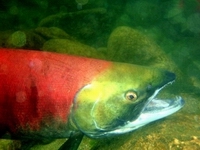
Researchers froze the testes of the yamame salmon, a fish indigenous to Japan that lives its entire life in rivers, before extracting primordial germ cells and implanting them into otherwise sterile rainbow trout hatchlings.
These primordial cells, called spermatogonia, were used by the fish's growing body to develop fully functional sperm in males and viable eggs in females, said Goro Yoshizaki at Tokyo University of Marine Science and Technology.
The eggs and sperm can be fused in vitro to produce a healthy yamame salmon, he said. "As far as these kinds of trout and salmon are concerned, I can say this methodology is complete, and we can recreate sperm and eggs, and individuals, of the original species any time," Yoshizaki continued.
Yoshizaki and his team are already working on a project aimed at preserving endangered fish species and would like to see if the same process is also possible in amphibians."I want to upgrade one class to another so that this technology can be applied eventually to reptiles and mammals," he said.





